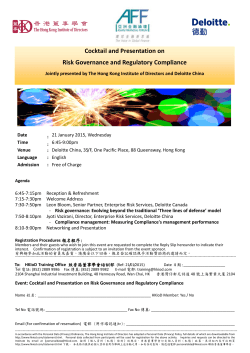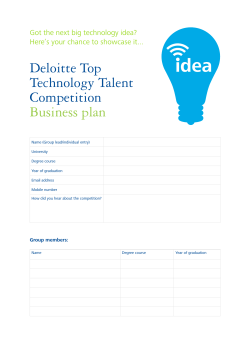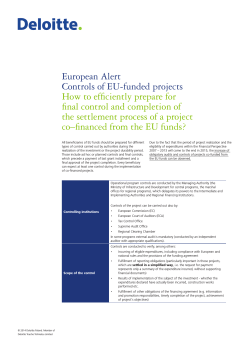
UNGC NN Stakeholder Engagement
Global Compact Nordic Network. Building a joint Nordic strategy Anne Mette Christiansen Deloitte Risk, Compliance & Sustainability, May 2015 Background and introduction 2 Deloitte Sustainability © 2014 Deloitte Why a Nordic Network strategy? On the NN meeting in Helsinki in Autumn 2013, the NN The need for a clear value proposition and strategy is reflected Steering Committee decided to develop a strategy for the in the input received from participants’ evaluations of the recent NN for the coming years – an exercise the network has not NN meetings. An overall review of the meeting evaluations previously undertaken. The need for a strategy is based on particularly point to a request for: different drivers: • more inter-action among members, • better quality of meetings, and 1. the recent release of the 2014–2016 International Strategy • more activity on specific UNGC issues. for the UN Global Compact impacts the role of the National net-works going forward and thus creates a need for assessing the role and state of the NN as it is now, and how it is prepared to integrate the new global strategy, 2. a need for action to ensure continued high level participation in meetings and other activities, and 3. to remain relevant to members in an increasing competitive landscape with many different networks and conferences being offered to sustainability professionals in the Nordic region. 3 © 2014 Deloitte The strategy process Phase 1 Timing November – Dec. 2013 Preparation Purposes Phase 2 • Steering Group decided on the strategy process Survey for all members • • • Deloitte and each of the National Contact Points planed the process Previous evaluations were explored Materials for stakeholder involvement developed • Online survey developed for all members Survey results analyzed by Deloitte and used as input for stakeholder engagement and overall strategy process All results shared with Steering Group Phase 4 January – March 2014 December 2013 • • Phase 3 Stakeholder engagements in each of the six Nordic countries • • • Each country conducted a stakeholder engagement process Deloitte facilitated the engagement process and report on this in Norway, Finland, Greenland and Denmark Sweden and Iceland have run the process from the national contact point Phase 5 May 2014 Reporting on Stakeholder Engagements and preparing for the Oslo meeting May 2014 Oslo meeting Strategy session Two sessions are held during this Oslo meeting • • • A report gathers results from the survey and stakeholder engagement Together with the report, summaries of stakeholder engagements and survey results are provided Phase 6 • One session is for Steering Group members with the aim of discussing findings and implications hereof The other session is for NN members taking part in the NN meeting, where findings will be presented Phase 7 Summer/ Fall 2014 Spring 2015 Developing the final strategy document Implementation and communication • • • • Strategy discussions in the Steering Group Final strategy document is drafted, circulated and finalized Strategy plan launched at Stockholm meeting for members Coinciding with the drafting of the strategy document, an implementation plan and communication plan should be developed © 2014 Deloitte Methodology Desk research Stakeholder engagement process • The main content of the new UN Global Compact strategy (global) • Denmark Examples of how other networks operate • One focus group with the National Focal Point and Steering Group members • Two focus groups of UNGC signatories and corporate members • One focus group with corporate non-member signatories • Nine individual interviews with corporate non-member signatories Online survey Norway • Conducted in January 2014 • One focus group with corporate NN members • Based on two questionnaires targeting respectively member signatories and non-member signatories in the Nordic region • One focus group with non-corporate NN members • One focus group with the National Focal Point and Steering Group members • Quantitative and qualitative questions • Invitation by email to all members and signatories of the UNGC in the Nordic region • One focus group with corporate non-member signatories • Two interviews with corporate non-members signatories • Respondent rate among members: Finland • • Respondent rate among non-members: • • 54 % answered fully and 16 % answered partly 37 % answered fully and 6 % answered partly • Two focus groups with corporate members Greenland • Sample breakdown: One focus group for corporate NN members and non-member signatories (HQ in DK) Sweden • One focus group with the National Focal Point and Steering Group • One focus group with corporate member signatories • One focus group with corporate non-member signatories Iceland • One focus group with UNGC signatories and members © 2014 Deloitte About members and non-members Key finding #1: Diversity in member and non-member characteristics Member organizations are generally larger than non-members When did your organization sign up to the UNGC? Members have been signatories for longer time than non-members Non-members are not as mature and advanced in regards to UNGC and CSR/sustainability in general as members How would you describe the level of maturity of the work with the UNGC in your organization? Members are more often than non-members involved in other CSR related networks Members usually have explicitly appointed CSR/sustainability positions – non-members do not © 2014 Deloitte Situational analysis – ‘As is’ Key finding #2: Insignificant value gain and low member engagement What do members gain? How would you evaluate the value your organization gets from being a member of the NN? And how do they engage? 62% 12% …has not been involved in any other activities besides the biannual meetings Highlighted areas which create value for members include: • Networking • Sharing experiences, best practice and knowledge • Keeping up with peers • Raising awareness internally in the organization However, approximately… 70% …find both the content of the meetings and the overall performance of the NN to be of medium value, i.e. neither ‘very high value’ nor ‘high value’. …never participate in meetings Barely 1 out of 4 participate in both meetings each year Main reasons for not attending meetings: • Can find inspiration or networking options elsewhere • Lack of time and resources • Location of meeting – don’t want to travel • And… 42% …of members say that their attendance depends solely on the program © 2014 Deloitte Situational analysis – ‘As is’ Key finding #3: Lack of promotion and competition from other networks “The UNGC Nordic Network? Never heard of it…” “The UNGC Nordic Network? No, we’re looking for something relevant to our industry” What are the main reasons for you choosing not to be a member of the UNGC Nordic Network? Are you or your organization a member of other CSR/sustainability related networks? Other reasons include a prevailing perception of underrepresentation of industry or maturity level Overall, there is a significant increase in CSR related network offerings – of all kinds © 2014 Deloitte Situational analysis – ‘As is’ Key finding #4: The role of the Nordic perspective • The Nordic element of the network divides the members (and nonmembers) as it is used today: • To some, it is a good way of meeting other companies in the same sector outside of the National realm • To some, the European or Global perspective is much more important • To some, the National perspective is enough (mostly newcomers to the network) • A few mention it as a problem as it adds travel costs and time spent. These companies tend to participate only in the national meetings or when the NN meeting is held locally Thus, the ‘Nordic Network’ is not a major selling point as it is used today overall. © 2014 Deloitte Prospect analysis – ‘To be’ Key finding #6: Request for continued meetings and further leverage of position Suggestions for meeting set-up and format: 1) Presentations on high level trends affecting the sustainability agenda bringing inspiration from strong experts 2) In-depth breakout sessions, workshops or similar where members can interact and discuss how to actually put the principles into practice: • Focus on interaction and practical implementation – challenges and honesty • Issue-specific topics or industries – segmented When asked about the ‘perfect Nordic Network’, most participants maintain the two annual meetings. But they add more quality and clear segmentation as well as additional activities between meetings. on CSR maturity level Suggestions from members on how to leverage the Nordic Network position and create further value: • Further focus on the link to the UNGC and its global activities – use access to knowledge • Really emphasize the UNGC part – instead of just being a CSR network • Make the Nordic platform relevant and useful - not just a practicality or formality • Improve communications to members as well as non-members to increase awareness and engagement © 2014 Deloitte Prospect analysis – ‘To be’ Key finding #7: Different interests among members and non-members 51% …of members show relatively high interest in issue-specific working groups, while non-members are more divided 70% …of members find industry or national based working groups within the Network worth considering. This applies to 60 % of non-members 41% …of members show relatively high interest in “member-to-member consultations” on relevant topics, whereas only 24 % of non-members show the same level of interest 75% …of members express a substantial interest in networking activities, compared to 53 % among non-members Many requests a mentor-mentee arrangement – which actually already exist © 2014 Deloitte Conclusions 12 © 2014 Deloitte Conclusions Perception today Future aspirations - members • The NN provides some value to most members, but only significant value to relatively few. In particular new comers to the UNGC find the NN relevant. Faced with increased competition from other networks, conferences and seminars, the NN needs to step up and improve its offerings to members to remain relevant. • Focusing on the link to the UNGC and its global activities. Focus on the UNGC to remain differentiated and relevant • The NN is perceived as an opportunity to gain inspiration and knowledge about the UNGC, to network and to connect with the UNGC. • The value proposition of the network is not clear to members as the network carters to a diverse group of members risking ‘sitting between two chairs’ • The Nordic aspect of the network is important to some members, but certainly not to all. Other aspects, such as the non-commercial nature and the specific focus on the UNGC principles are mentioned as other benefits • Leveraging the Nordic platform to make it relevant and usefull, not just a practicality • Provide significantly better and more professional meetings twice annually segmented in content to address the different levels of maturity for companies in the network • Provide additional networking and learning activities for members such as working groups between meetings, National meetings between Nordic ones and consultations • Improve communications significantly to members so that they also be-come aware of the value provided by the network. • There are many competitors to the NN in terms of companies’ focus, time and money – all countries offer other opportunities for finding inspiration, knowledge and networking in other settings 13 © 2014 Deloitte Deloitte Consulting – turning ideas into reality Deloitte Consulting focuses on developing and improving the efficiency of the clients’ organisation, core processes, financial management and IT to help realise their strategic objectives. We know all the ins and outs of the public and private sectors and combine our professional competencies with the skill in managing, steering and implementing projects in complex environments. Be it as advisers or process managers from idea stage to implementation. Deloitte Touche Tohmatsu Limited Deloitte refers to one or more of Deloitte Touche Tohmatsu Limited, a UK private company limited by guarantee, and its network of member firms, each of which is a legally separate and independent entity. Please see www.deloitte.com/about for a detailed description of the legal structure of Deloitte Touche Tohmatsu Limited and its member firms. © 2014 Deloitte Statsautoriseret Revisionspartnerselskab. Member of Deloitte Touche Tohmatsu Limited
© Copyright 2025









